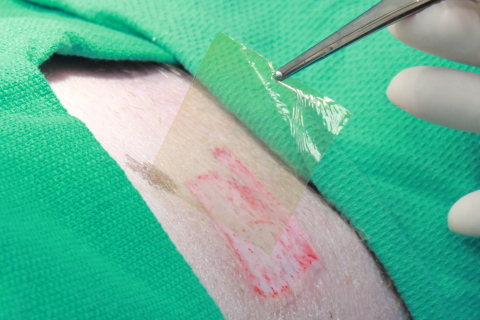Imbed Biosciences, Inc. announced that it has been awarded a $1.5 million two-year Small Business Innovation Research grant from the National Institute for Arthritis and Musculoskeletal and Skin Diseases at the National Institutes of Health.
MADISON, Wis.--(BUSINESS WIRE)-- Imbed Biosciences, Inc. (Imbed) announced today that it has been awarded a $1.5 million two-year Small Business Innovation Research (SBIR) grant from the National Institute for Arthritis and Musculoskeletal and Skin Diseases (NIAMS) at the National Institutes of Health (NIH). The grant will support research to develop a bioresorbable wound dressing with silver and gallium metal ions that can kill bacteria hiding in biofilms in wounds.
This press release features multimedia. View the full release here: https://www.businesswire.com/news/home/20190927005518/en/

Microlyte silver matrix (5x5 cm) held over a porcine partial-thickness surgical wound (Photo: Business Wire)
“This antibiofilm dressing research program is built upon the clinical success of our next-generation FDA cleared Microlyte silver dressing that has been used in the treatment of thousands of chronic wounds patients in the U.S.,” said Ankit Agarwal, PhD, co-founder and CEO of the company and the Principal Investigator on the grant. Microlyte is an ultrathin polymeric film dressing made of bioresorbable synthetic polymers. It contains ionic and metallic silver that kill bacteria in contact with the dressing on a wound surface for up to three days. “Research in this NIH Phase II grant will document a synergy in the unique ability of gallium ions to penetrate biofilms and sensitize bacteria to the antimicrobial action of silver ions,” said Agarwal.
Biofilms are surface-associated bacterial communities that are impenetrable to antibiotics and antimicrobials. Chronic wounds such as diabetic foot ulcers and venous leg ulcers have persistent biofilms that delay healing for several months.
According to the NIH, healthcare costs associated with treatment of chronic wounds exceeds $25 billion annually in the U.S. affecting 6.5 million patients. The standard of care is to surgically debride wounds with a scalpel. However, it leaves behind fragments in the complex topography of wounds which reestablish biofilms within a week. This results into a vicious cycle of repeated surgical debridement and aggressive wound management with high doses of antibiotics.
In Phase I research, the company reported that a combination of silver and gallium in its Microlyte dressing eradicated mature biofilms in a murine wound model that did not respond to a commercial silver dressing. “Innovation is in our Microlyte multilayer film technology where we can incorporate stabilized forms of silver and gallium metal ions at concentrations that are effective in killing bacteria in biofilms but do not harm skin cells involved in wound healing,” said Gaurav Pranami, PhD, Vice President of R&D at the company and a co-Investigator on the grant.
“There are no effective therapeutic options available in clinics today to completely remove biofilms from wounds. Microlyte microscale dressing is unique because it adheres intimately with the deep wound tissue surface where bacterial biofilms colonize. The localized therapy with combination of antibiofilm gallium and antimicrobial silver can be both effective and non-toxic,” said co-founder Dr. Michael Schurr, MD, critical care surgeon at Mission Hospital in Asheville, NC, and Director of General Surgery Residency Program at the Mountain Area Health Education Center.
Imbed will collaborate under a subcontract on this grant with scientists in the School of Veterinary Medicine at University of Wisconsin-Madison to conduct preclinical studies in animal wound models necessary for FDA clearance. Prof. Jonathan McAnulty, DVM, PhD, Chair of Surgical Sciences, and Prof. Charles Czuprynski, PhD, Chair of Pathobiological Sciences will be lead investigators on the subcontract. A related press release from the University is available at this link – https://news.wisc.edu/uw-madison-local-startup-testing-a-one-two-punch-against-hard-to-heal-wounds/
About Imbed Biosciences Inc.: Imbed is a privately held biotech company emerging as a leader in the development of advanced therapies for burns, chronic ulcers and surgical wounds. The Company has a portfolio of products in research based on its patented Microlyte matrix technology to combat local pain and infections in complex wounds. The Company is registered with U.S. FDA as a medical device manufacturer and maintains an ISO 13485 certified Quality Management System. The research is funded by an SBIR grant #2R44AR073710-02 from NIAMS. For more information, visit http://www.imbedbio.com.
View source version on businesswire.com: https://www.businesswire.com/news/home/20190927005518/en/
Contacts
Contact Information:
Ankit Agarwal, PhD, CEO
ankit@imbedbio.com
608-237-1523
Source: Imbed Biosciences, Inc.







